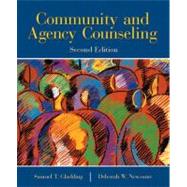
| History and Foundations of Counseling | |
| A History of Community Counseling | |
| The Effective Community Counselor: Personal, Educational, Theoretical, and Systemic Factor | |
| Ethical and Legal Aspects of Counseling | |
| Counseling with Specific Populations | |
| Multicultural Counseling | |
| Counseling with Children, Adolescents, and College Youth | |
| Counseling Adults and the Aged | |
| Gender-Specific Counseling | |
| Counseling Specialties | |
| Working with Groups | |
| Marriage and Family Counseling | |
| Mental Health, Addiction, and Employee Assistance Counseling | |
| Career and Employment Counseling | |
| Consultation | |
| Assessment and the Use of Psychological Tests | |
| Evaluation and Research in Counseling | |
| Counseling and Creativity: Use of the Expressive Arts | |
| Practical Aspects of Being A Community Counselor | |
| Appendices: Ethical Standards of the American Counseling Association/DSM IV Classifications | |
| Index | |
| Table of Contents provided by Publisher. All Rights Reserved. |
The New copy of this book will include any supplemental materials advertised. Please check the title of the book to determine if it should include any access cards, study guides, lab manuals, CDs, etc.
The Used, Rental and eBook copies of this book are not guaranteed to include any supplemental materials. Typically, only the book itself is included. This is true even if the title states it includes any access cards, study guides, lab manuals, CDs, etc.